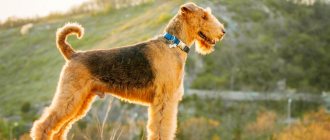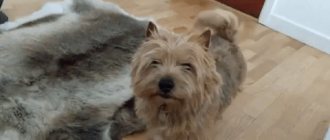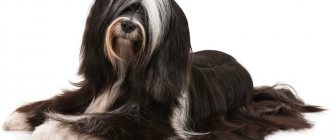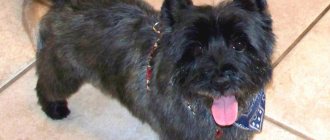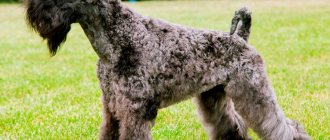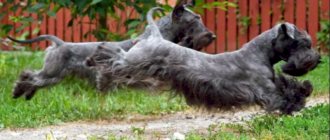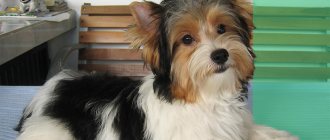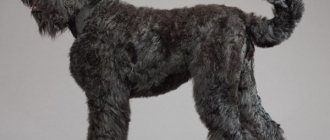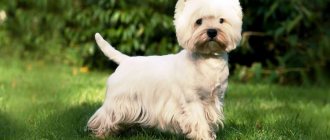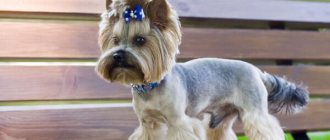Story
The Skye Terrier breed originates from the Isle of Skye (Hebrides), from which it gets its name.
The story goes that Spanish explorers brought long-haired dogs to the Isle of Skye, which they then began crossing with native terriers. The Skye Terrier as a breed was first described in the 16th century, it was mentioned in the book “On the Dogs of England,” written by dog handler and scientist John Caius.
In ancient times, Skye terriers were kept mainly for hunting. They worked great on foxes, badgers and other burrowing animals. Centuries have passed and now this breed is loved as a companion dog. However, the call of her ancestors lives in her blood to this day, and the Skye Terrier is ready to easily learn the skill of hunting.
Interesting fact
There is an amazing story about a Skye terrier named Bobby. After his owner died, the dog came to his grave every day for 14 years and died without leaving it! He was buried there. In the city of Edinburgh (Scotland) today there is a monument to the Skye Terrier, which people erected in memory of the faithful Bobby.
Breed Features
As soon as the Skye Terrier appears in public, everyone around him is immediately charged with a positive mood. All this happens thanks to the combination of subtle humor and the manners of a true British gentleman in one four-legged pet. But that’s not all: dogs of this species are distinguished by many internal advantages. The most valuable thing is devotion and loyalty, which are not a bit inferior to the famous Akita Inu Hachiko.
Interesting! Skye terrier Bobby received recognition in the form of a monument in Edinburgh (Scotland). His story still touches to the very depths of the heart: a devoted four-legged pet returned to a person’s favorite coffee for 14 years after the loss of its owner. In this establishment, Bobby was treated to delicious buns, after which he returned to guard the grave of his owner.
In addition to boundless devotion, representatives of the species are characterized by courage, strength, and independence. The animal is cautious towards strangers, but if you win its trust and affection, the Sky Terrier will give the person its loyalty and love. In most cases, four-legged pets choose one member of the household to whom they become most attached.
He is loyal to the children with whom he lives and grows up. To avoid shyness, early socialization is necessary. Skye Terriers are sensitive to reprimands, but they do not put up with it. Representatives of the breed are responsible defenders of the owner and the home. They prefer and crave human attention, friendship and affection.
Standard
The Skye Terrier breed belongs to the group of small terriers without working tests. Registration with FCI No. 75. According to the standard he has:
- The head is large and slightly elongated.
- The shape of the muzzle is “terrier” type.
- The ears are medium-sized, high-set, erect, and heavily covered with hair.
- Scissor bite.
- The nose is black.
- The eyes are not large, oval in shape. Eye color depends on coat color and can be all shades of dark or brown.
- The neck is of medium length.
- The body is elongated. The body length can reach 100 cm.
- The chest has an oval shape.
- The limbs are short and straight, well developed, muscular.
- The tail is medium length, straight. Slightly curved at the end.
- The coat is long and smooth. The undercoat is soft and short.
- The coat color is plain or tan. The base color of the coat varies; it can be reddish, gray, bluish, black and white.
Dimensions and weight of an adult dog
Males at the withers reach up to 27 cm, weighing 11 kg. Females reach up to 23 cm at the withers and weigh up to 8 kg.
Lifespan
Life expectancy is 14-16 years.
Who is it suitable for?
There is no need to be encouraged by the funny appearance of the Skye Terrier and hope that he will lie on the sofa like a Pekingese. Such a dog requires competent education and training.
The Skye Terrier will be an ideal pet for a person who can be an authority figure for him. Only an owner who is confident in his abilities and strong in spirit will be able to completely capture the heart of this rare dog. For athletes and people who love an active lifestyle, the Skye Terrier will bring happiness and joy to the home.
Due to its active nature, the breed is not suitable for families in which there is a lot of noise and there is no time for raising and properly walking the pet. It is also not suitable as a toy for a child or as an interior decoration.
The Skye Terrier will not be a friend to homebodies who like to lie on the couch. It is also highly not recommended for older people to buy this breed.
Character
Typical for a working terrier. These dogs are smart and brave, and have a reputation as loyal friends. There are not many breeds that are also devoted to their owner. They reveal themselves best in small families; they are often attached to one owner and ignore others.
If a Skye Terrier has chosen an owner, then it is faithful to him all his life and there is a lot of evidence of how they died soon after the death of a person.
They do not like strangers with whom they are nervous or distant. Without proper socialization, Skye Terriers can be aggressive or shy around strangers. Since they are much stronger than dogs of similar size, socialization is especially important.
Like most terriers, they are fast and agile, responding with a bite to roughness or danger. Their loyalty makes them good guard dogs, alerting the owner to someone or something new in sight. Despite their small size, they are good watchdogs. If you are looking for a small protector, then the Skye Terrier is perfect for this role. If you want a dog that you can go out with and play with everyone, then this is clearly not the breed.
Most Skye Terriers would prefer to be the only dog in the family or have a friend of the opposite sex. They love to challenge other dogs to fight, regardless of their size and strength. And they never back down.
They are small for large dogs and can cause serious injury, but strong for small dogs and can cause serious injury. They are calm with familiar dogs, but new ones need to be introduced carefully, especially if there is an adult Skye Terrier in the house.
They can start a quarrel with old acquaintances, let alone with new ones. It is especially unwise to keep dogs of the same sex at home.
They also do not get along with other animals, as they have been killing rodents for hundreds of years. The Skye Terrier is capable of catching and killing an animal significantly larger than itself. They are famous for their ferocity in fights with foxes, badgers and otters.
They have a strong hunting instinct and will chase almost any animal. They are capable of catching up and killing a squirrel or a cat. This means that not everything is smooth with cats, especially if the dog did not grow up in their company.
They are playful and love attention, but only from those they trust. However, they do not need a lot of activity
Regular walks and the opportunity to play will completely satisfy the Skye Terrier.
Some people believe that terriers are impossible to train, but this is not the case with the Skye terrier. Like most terriers, the Skye is intelligent and interested in communicating with its owner.
If you use the right techniques, you can achieve excellent obedience, comparable in level to obedience competitions. Since the dog is very sensitive, you should not shout at it. They respond much better to affection and praise; if you scold him, you can achieve the opposite effect.
Interesting photo
Health and illness
A huge advantage, in terms of the health of the breed, is its small number, which means that its breeding has not touched the hands of careless breeders. Skye terriers boast good health and are reputed to live long lives.
The list of congenital diseases that can manifest themselves to one degree or another in Skye Terriers is not long - these include displacement of the vertebral discs and joint diseases.
A puppy purchased from healthy parents, in principle, is not capable of inheriting congenital diseases.
All other diseases are directly related to improper care, and in this case the blame falls entirely on the owner.
For example, the result of poor nutrition is diseases of the digestive tract of various origins and skin rashes, and the result of poor care is inflammation of the ears, eyes and colds.
Tendency to diseases
- Behavioral disorders - increased aggressiveness, panic attacks, etc.
- Distichiasis is abnormal growth of eyelashes.
- Excessively large opening for the spine in the skull.
- Epiphyseal dysplasia.
- Undeveloped larynx.
- Hypothyroidism.
- Excessively twisted tail.
- Incorrect placement of the eye lens.
- Lymphocytic thyreoilitis, the consequence of which is a destroyed thyroid gland.
- Myasthenia gravis is an abnormality of muscles and nerves that leads to fatigue. Enlargement of the esophagus leads to regurgitation of food.
- Thyroiditis is a disease of the thyroid gland.
- Ulcerative colitis – problems with the colon.
- Von Willebrand-Jurgens disease occurs in 60 dog breeds. Platelets do not function correctly, resulting in bleeding.
Estrus
The first heat in female Skye Terriers can begin at 6 or 8 months, at this time bleeding is minimal and does not last long. The bitch takes care of herself and usually the first heat does not cause trouble for the owner.
During estrus, it is necessary to observe the dog’s behavior, especially while walking, in order to avoid its close contact with a male individual.
The beginning of the first heat indicates that the dog has already reached puberty, but this does not mean that she is ready to physically bear and give birth to healthy offspring.
The second heat lasts much longer, and the regularity of heat occurs 2 times a year. During the period of the 2nd heat, a Skye Terrier bitch can be crossed with a male, at which time the female has already reached physiological readiness to become a mother.
Recommendations
- veterinarians recommend allowing a female dog to give birth to at least one litter before spaying her;
- if an unwanted mating occurs, then in order to avoid pregnancy the bitch should be given the drug “Alizin” (according to the instructions);
- the occurrence of estrus without mating can threaten the bitch with a false pregnancy;
- if the heat lasts for a long time, with active blood or purulent discharge, then the dog should be urgently shown to a veterinarian;
- if breeding puppies is not part of the owner’s plans, then sterilization is the best way out.
Breeding Yorkshire Terriers
Only dogs with a pedigree are suitable for breeding. To do this, you must obtain permission to breed from the club where the dog is registered. Otherwise, your pet will have an unscheduled mating, and the babies will be left without a pedigree.
The first estrus in animals occurs at 8-10 months. This can happen earlier, but the pet is absolutely not ready for childbirth at this age. This determines the moment of puberty. On average, estrus lasts 2-3 weeks. At first, the discharge is dark and drop-shaped, then it becomes lighter, which indicates the imminent onset of ovulation.
In order for puppies to be born healthy, the following conditions must be met for the bitch:
- Weight from 2-3 kg. Insufficient weight can lead to the death of the mother. With a weight of 1.5 to 2 kg, it is often necessary to resort to a cesarean section;
- It is better to start breeding your pet from the 3rd heat. On average, this occurs at 1.5-2 years of life;
- The female must be vaccinated. No more than 10 months and no less than one month should have passed since the last vaccination.
The ideal option would be to give birth before the pet is 4 years old. During this period, the ligaments of the birth canal are most elastic. After the 8th year, pregnancy is life-threatening for a Yorkie and can be fatal. Without compromising her health, a bitch can give birth once a year and no more than 6 times in her entire life.
Requirements for a male:
- Optimally, the weight of the partner should be less than that of the male. This way, delivery will take place with minimal risks. The difference in height is no more than 5 cm;
- Sperm are ready for fertilization only from 8-10 months of life. It is better to start from 1 year, the next mating is not earlier than in 4-5 months. After 2 years of age, you can mate your pet once a month;
- The male must be vaccinated and examined by a specialist.
Mating
Skye terriers can be bred when they reach physiological maturity; this applies to both females and males. It is best for the dogs to be 1.5 years old.
Recommendations
- Breeding a bitch and a dog is not always easy. It is advisable that they know each other much earlier than they are asked to have sexual intercourse.
- Sometimes the bitch ignores the dog and does not let him near, and sometimes the dog is too timid. In this case, it is better to find them another pair.
- The best day for mating is the 10th day from the start of estrus.
- Many dogs themselves know how to make offspring and do not need human participation.
- Breeders sometimes provide assistance to young male dogs, directing their physiological activity in the right direction.
- A male dog exhibits his masculine abilities best in his own territory.
- At the end of sexual intercourse, the bitch and male fall into the “ligament” position. Young individuals may worry and even whine at this time, but they should not be touched or disturbed at this time. On the contrary, you need to calm down with words and show that the owner is nearby and there is no danger.
- Mating is not always successful and the dog may not become pregnant. There are many reasons for this, dead sperm of a male dog or problems with the genitals of a female dog, as well as their individual incompatibility.
Feeding options
The Skye Terrier is not an omnivorous dog. They choose what they like and refuse food that they don’t like. There are two feeding options for the Skye Terrier breed. This can be premium dry food or natural food. Each owner chooses at his own discretion.
Natural feeding should be of high quality and balanced. At home, it is difficult to regulate the balance of natural food, and therefore multivitamins must be added to the main diet.
In natural food, lean meat must predominate 50%.
Allowed products: cereals (buckwheat or rice), carrots, pumpkin, broccoli, zucchini, offal, sea fish, chicken eggs, cottage cheese and kefir with low fat content. It is advisable to give fish and eggs no more than 1-2 times a week. It is useful to add fish oil to your food, as well as seasonal fruits.
Prohibited foods: fatty meat, tubular bones, various sweets, white cabbage, flour products, smoked, spicy and salty foods. It is strongly not recommended to feed your pet “from the table”.
It is forbidden to feed your pet dry and natural food at the same time. This can lead to problems with the digestive system and malfunction of the dog's pancreas.
| pros | Minuses |
| Original appearance | The cost of a purebred puppy is high due to the rarity of the breed |
| Compact size | Needs active walking. |
| Devotion | Tendency to dig and chase anything that moves |
| Distrust of strangers | Ability to show aggression towards strange dogs |
| The ability to tolerate loneliness without problems | Requires a competent and individual approach to education and training |
| The wool has no dog smell | Long hair requires regular and long-term care |
| Quick wits | Hyperreactivity |
There are no perfect dogs. To some, the disadvantages of the Skye Terrier breed will seem insignificant, but to other people they will be critical. Here, as they say, to each his own.
Skye Terrier
The only terrier that can be called “glamorous,” the Skye Terrier is a large, decorous dog in a small body, long and squat, with long hair. The Skye Terrier shows that it is a companion and not a working terrier. A dog with a strong character and a high opinion of himself. Her respect still needs to be earned. Intelligent, sensitive and stubborn, he is calmer than most terriers and adapts very well to physical activity. He is loyal to his owner, often recognizing only him, but is distrustful of strangers: early socialization is important so that this trait does not become a problem. It should not be left with small pets either.
Skye Terriers are descended from working terriers from the Scottish Highlands. In the 19th century they became a show breed when Queen Victoria adopted one. It's a pity that they are not very popular today.
- Original purpose: Rodent hunter;
- Height at withers (males): 24-27 cm (9.5-10.5 inches);
- Height at withers (females): 23 -25 cm (9-10 inches);
- Weight: 8.5-10.5 kg (19-23 lb);
- Life expectancy: 12-14 years.
WHAT COLOR?
Black, dark or light gray, tan, fawn, all with black ears. A small white spot on the chest is acceptable. Puppies (except fawn) are born black, but at the age of three to four months they change their color.
WHAT TYPE OF HOME?
As a rule, a Skye is happy if he is with his owner. Ideally, he needs a garden with a strong fence where he can run freely, but he adapts to apartment life as long as he is taken for a walk several times a day - this stimulates his physical and mental health.
WHAT COAT CARE?
The flowing coat needs to be brushed twice a week to prevent matting, and it is better to clean the hairs around the eyes and muzzle every day. Spayed bitches have softer fur; it needs to be brushed more often. Pet owners usually cut their fur shorter to make grooming easier.
HOW are they suitable for the role of a pet?
Skye is not the best choice for a family. Affectionate and kind to their owners, Skye Terriers do not like to be teased, and some may even bite. Therefore, they are not recommended for families with small children.
WHAT type of owner?
Skye is not one of those dogs that will suit just anyone. He gives incredible devotion without servility and needs an owner who will appreciate this stubborn, arrogant character. It is best if the owner has the same strong will and can devote a lot of time to him. The Skye Terrier needs company. If he is alone for a long time, he gets bored and becomes destructive.
HOW do they get along with other pets?
Terriers are naturally bossy and strive to dominate. In order for Skye to get along with other dogs as he grows up, he needs early socialization. If he grows up with cats, he will accept them as family members. But no terrier should be left alone with small animals, such as rabbits and hamsters.
WHAT physical activity is needed?
Moderate. Skye terriers adapt to different activities, but an adult Skye will happily take an hour-long walk every day. Puppies should not be overloaded - this is harmful to their growing bones. Starting at six months of age, gradually increase the duration of the distance.
HOW easy is it to train them?
Not easy. The Skye Terrier has a very strong character and does not have an innate tendency to obey. He is smart, learns quickly, but will not want to do something if he does not understand why. So training must be firm, persistent and accompanied by rewards. With the right approach, he will work with you, but not for you.
WHAT are good qualities?
Loving, loyal, outstanding character, good watchdog, fearless, orderly, cheerful and ready to play with his owner.
WHAT should we be afraid of?
Early socialization is needed to prevent hostility towards strangers and potential aggression towards other animals.
WHAT medical problems?
The breed is generally healthy, with a few hereditary problems. Sometimes, early closure of the growth plates in the forelimbs (chondrodysplasia), causing lameness, can begin due to overexertion in puppies.
Care and haircut
The owner of the Skye Terrier breed should try to ensure that his pet is always well-groomed. The terrier's long coat needs to be brushed every day (or at least every other day). It is recommended to choose a comb with natural bristles and in the form of a comb.
You can trim your Skye Terrier; its grooming involves various options for cutting its coat.
However, with a haircut, he loses his chic and looks like an ordinary mongrel, because it is his luxurious coat that is his main highlight!
It is not necessary to wash your pet often, only when it gets dirty. It is recommended to choose a shampoo that is suitable for the type of coat, and after washing, apply a balm. This will make the terrier's coat shiny and easier to comb.
It is recommended to inspect and clean the eyes and ears once a week. This procedure can be done using special lotions. Nails should be trimmed as they grow, using a nail clipper.
Having an undercoat protects Skye Terriers from bad weather. Except for extreme cold. When the temperature drops to minus 10 degrees, you need to walk him in dog overalls.
It is recommended to keep the Skye Terrier in a private home, where he can run around on his own. If the pet lives in an apartment, then you need to walk with it 2 times a day and for at least 1 hour.
Owner reviews
Marina 32 years old (Moscow)
I have long wanted to get myself a “shaggy” friend; everyone is already tired of Yorkies and Spitzes. I wanted something like that) I bought my Skychik at the Moscow nursery and immediately fell in love with him. He and I are best friends. He became not only a friend and comrade for me, but also my bodyguard. I just fell in love with him and I recommend only this breed to all my friends.
Dmitry 42 years old (Sochi)
My wife has been asking for a long time to bring a dog into the house, but we couldn’t decide on the breed. I accidentally saw a photo of a Skye terrier on the Internet. We read about this rare dog for a long time and finally decided to buy it. They called it Skye. This girl brought joy and energy into our lives. In a nutshell, my wife is incredibly happy. True, now Skye took my place next to my wife on the bed.
Artem 30 years old (Ryazan)
I live alone, and to brighten up the loneliness I decided to envy myself a four-legged friend. I couldn’t afford a big dog, since I live in a small apartment. I bought my Skye Terrier from the St. Petersburg kennel and was pleased. We spend all the time together, my baby Chick has changed my life and now our mornings begin with a run.
